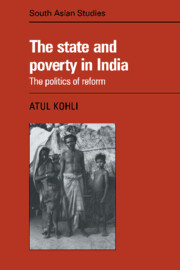Book contents
- Frontmatter
- Contents
- List of Tables and Figures
- Acknowledgements
- Introduction
- 1 The State and Redistributive Reforms
- 2 Democracy and Development in India: an Interpretation
- 3 West Bengal: Parliamentary Communism and Reform from above
- 4 Karnataka: Populism, Patronage, and Piecemeal Reform
- 5 Uttar Pradesh: Political Fragmentation, Middle-Peasant Dominance, and the Neglect of Reforms
- 6 Conclusion: The State and Reform in Democratic–Capitalist Development
- Appendix I On the Political Relevance of Social Classes in a Developmental Setting
- Appendix II Does Agriculture Growth Really “Trickle-down” in India?
- Bibliography
- Index
- CAMBRIDGE SOUTH ASIAN STUDIES
Appendix I - On the Political Relevance of Social Classes in a Developmental Setting
Published online by Cambridge University Press: 27 October 2009
- Frontmatter
- Contents
- List of Tables and Figures
- Acknowledgements
- Introduction
- 1 The State and Redistributive Reforms
- 2 Democracy and Development in India: an Interpretation
- 3 West Bengal: Parliamentary Communism and Reform from above
- 4 Karnataka: Populism, Patronage, and Piecemeal Reform
- 5 Uttar Pradesh: Political Fragmentation, Middle-Peasant Dominance, and the Neglect of Reforms
- 6 Conclusion: The State and Reform in Democratic–Capitalist Development
- Appendix I On the Political Relevance of Social Classes in a Developmental Setting
- Appendix II Does Agriculture Growth Really “Trickle-down” in India?
- Bibliography
- Index
- CAMBRIDGE SOUTH ASIAN STUDIES
Summary
I have used the concept of social class throughout this study but have not formally defined it. Because the study is concerned primarily with the role of the state in society, I did not feel the need to formalize my use of class as a concept within the main text; that would have detracted from the central concern with political issues. Class as a concept is nevertheless a controversial and a much abused one. This appendix briefly elaborates on my understanding of social class in a developmental setting and, in an abstract fashion, outlines how social classes became politically significant forces.
Following Marx, three questions can be raised concerning the organization of production in a Third World society: who owns the means of production? Who controls the decisions on production? And who has primary access to the fruits of production? To the extent that the means of production are owned by some and not by others and to the extent that the owners control both the decisions on and the fruits of production, the production system is organized on class lines. In other words, if the division in the ownership of production forms a parallel and reinforcing hierarchy to the division of labor and the patterns of exchange, then the production system generates cleavages along which social actors are interlocked into class relations. Those at the top of this class hierarchy enjoy, at minimum, a disproportionate access to the wealth of society. In most of these cases, however, the upper classes are not only relatively wealthy, but also enjoy high status and considerable political power.
- Type
- Chapter
- Information
- The State and Poverty in India , pp. 237 - 241Publisher: Cambridge University PressPrint publication year: 1987

